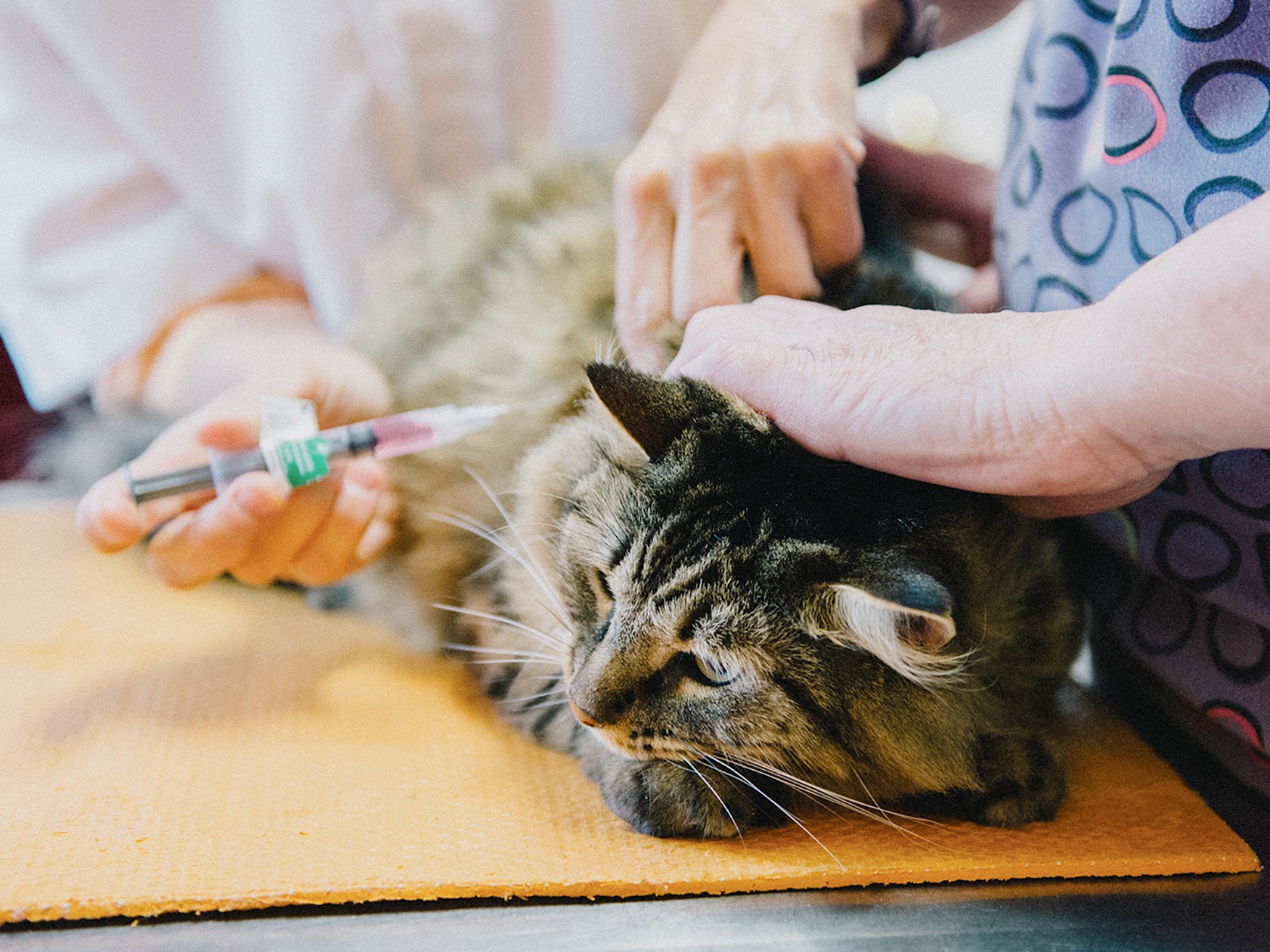Are you curious about whether your beloved pets can contract RSV from humans? At PETS.EDU.VN, we understand your concerns about pet health, particularly regarding respiratory illnesses. This article provides a comprehensive guide on RSV in pets, differentiating it from other common respiratory infections and offering expert advice to ensure the well-being of your furry companions. Understanding the risks and taking preventive measures can ensure the health and happiness of your animal companions.
1. Understanding Respiratory Syncytial Virus (RSV)
Respiratory Syncytial Virus (RSV) is a common respiratory virus that affects humans, especially young children and older adults. While RSV is well-known for its impact on human health, pet owners often wonder if their furry friends are also susceptible. Let’s explore the nature of RSV and its potential effects on pets.
1.1 What is RSV?
RSV is a contagious virus that causes infections of the lungs and respiratory tract. In humans, it typically results in mild, cold-like symptoms. However, in infants, young children, and the elderly, RSV can lead to more severe conditions like bronchiolitis and pneumonia. Common symptoms in humans include:
- Runny nose
- Cough
- Sneezing
- Fever
- Wheezing
- Difficulty breathing
1.2 How RSV Spreads in Humans
RSV spreads through respiratory droplets produced when an infected person coughs or sneezes. These droplets can land on surfaces or be inhaled directly. Common ways RSV spreads include:
- Close contact with infected individuals
- Touching contaminated surfaces and then touching the face
- Respiratory droplets in the air
1.3 Is RSV the Same Across Species?
The simple answer is no. While the name is the same, the RSV that affects humans is different from the RSV that affects animals. According to research published in the Journal of General Virology, human RSV is specific to humans and chimpanzees, meaning your dog or cat can’t catch it from you. However, calves can be infected with a different strain of RSV.
2. Can Pets Get RSV From Humans?
The good news for pet owners is that human RSV is generally not a risk to dogs and cats. The strain of RSV that affects humans is species-specific, meaning it primarily targets human cells and does not easily infect animals. However, pets are susceptible to other respiratory infections that can present similar symptoms.
2.1 RSV in Dogs
Dogs are not typically susceptible to human RSV. The American Veterinary Medical Association (AVMA) confirms that while dogs can contract various respiratory illnesses, RSV is not among them. Common respiratory infections in dogs include:
- Kennel Cough: A highly contagious respiratory infection.
- Canine Influenza: A flu virus specific to dogs.
- Pneumonia: Inflammation of the lungs.
2.2 RSV in Cats
Similar to dogs, cats are not generally at risk of contracting human RSV. Cats are more prone to feline-specific respiratory infections. According to the Cornell University College of Veterinary Medicine, common respiratory infections in cats include:
- Feline Viral Rhinotracheitis (FVR): Caused by feline herpesvirus.
- Feline Calicivirus (FCV): A common cause of upper respiratory infections.
- Chlamydophila Felis: A bacterial infection affecting the eyes and respiratory tract.
2.3 Why Human RSV Doesn’t Affect Pets
The reason human RSV doesn’t typically affect pets lies in the virus’s specificity. Viruses often have specific receptors that allow them to attach to and infect host cells. Human RSV is adapted to target receptors found in human respiratory cells, which are different from those in pets. This makes it difficult for the virus to effectively infect and replicate in animals.
3. Common Respiratory Infections in Pets
While pets are not generally susceptible to human RSV, they can contract other respiratory infections. Recognizing the symptoms and understanding the causes can help you protect your furry friends.
3.1 Kennel Cough in Dogs
Kennel cough, or infectious tracheobronchitis, is a highly contagious respiratory infection in dogs. It is often caused by a combination of viruses and bacteria, with Bordetella bronchiseptica being a common culprit.
3.1.1 Symptoms of Kennel Cough
- Persistent, forceful cough (often described as a “goose honk”)
- Runny nose
- Sneezing
- Lethargy
- Reduced appetite
3.1.2 Prevention and Treatment
- Vaccination: The Bordetella vaccine can help prevent kennel cough.
- Avoidance: Minimize contact with infected dogs, especially in crowded environments.
- Treatment: Antibiotics, cough suppressants, and rest are typically prescribed.
3.2 Canine Influenza (Dog Flu)
Canine influenza is a contagious viral infection affecting dogs. There are two main strains: H3N8 and H3N2.
3.2.1 Symptoms of Canine Influenza
- Cough
- Fever
- Runny nose
- Lethargy
- Reduced appetite
- Pneumonia (in severe cases)
3.2.2 Prevention and Treatment
- Vaccination: Vaccines are available for both H3N8 and H3N2 strains.
- Avoidance: Keep dogs away from infected animals.
- Treatment: Supportive care, such as fluids and rest, may be necessary. Antibiotics can be used to treat secondary bacterial infections.
3.3 Feline Viral Rhinotracheitis (FVR)
FVR is a common upper respiratory infection in cats caused by the feline herpesvirus type-1 (FHV-1).
3.3.1 Symptoms of FVR
- Sneezing
- Runny nose
- Conjunctivitis (inflammation of the eyes)
- Fever
- Lethargy
- Loss of appetite
3.3.2 Prevention and Treatment
- Vaccination: Core vaccines include protection against FVR.
- Management: Reduce stress, provide good nutrition, and manage symptoms with antiviral medications and supportive care.
3.4 Feline Calicivirus (FCV)
FCV is another common viral infection in cats that causes upper respiratory symptoms.
3.4.1 Symptoms of FCV
- Sneezing
- Runny nose
- Mouth ulcers
- Fever
- Lethargy
- Loss of appetite
3.4.2 Prevention and Treatment
- Vaccination: Core vaccines include protection against FCV.
- Management: Supportive care, including maintaining hydration and nutrition, is essential.
3.5 Bordetella Bronchiseptica in Cats
While commonly associated with kennel cough in dogs, Bordetella bronchiseptica can also infect cats, causing respiratory symptoms.
3.5.1 Symptoms of Bordetella Bronchiseptica in Cats
- Coughing
- Sneezing
- Nasal discharge
- Mild fever
- Lethargy
3.5.2 Prevention and Treatment
- Vaccination: A vaccine is available, though not part of the core vaccine series.
- Treatment: Antibiotics are typically used to treat this bacterial infection.
3.6 Comparison Table of Respiratory Infections
| Infection | Species | Common Causes | Symptoms | Prevention | Treatment |
|---|---|---|---|---|---|
| Kennel Cough | Dog | Bordetella bronchiseptica, viruses | Persistent cough, runny nose, sneezing, lethargy | Bordetella vaccine, avoid contact with infected dogs | Antibiotics, cough suppressants, rest |
| Canine Influenza | Dog | H3N8, H3N2 viruses | Cough, fever, runny nose, lethargy, reduced appetite, pneumonia (severe) | Canine influenza vaccine, avoid contact with infected dogs | Supportive care, antibiotics for secondary infections |
| Feline Viral Rhinotracheitis | Cat | Feline herpesvirus type-1 (FHV-1) | Sneezing, runny nose, conjunctivitis, fever, lethargy, loss of appetite | Core vaccines, reduce stress | Antiviral medications, supportive care |
| Feline Calicivirus | Cat | Feline calicivirus (FCV) | Sneezing, runny nose, mouth ulcers, fever, lethargy, loss of appetite | Core vaccines | Supportive care |
| Bordetella bronchiseptica | Cat | Bordetella bronchiseptica | Coughing, sneezing, nasal discharge, mild fever, lethargy | Bordetella vaccine (non-core) | Antibiotics |



4. Recognizing Symptoms: When to See a Vet
Prompt veterinary care is essential if your pet shows signs of respiratory illness. Early diagnosis and treatment can prevent complications and ensure a quicker recovery.
4.1 Key Symptoms to Watch For
- Coughing
- Sneezing
- Runny nose or eyes
- Difficulty breathing
- Wheezing
- Lethargy
- Loss of appetite
- Fever
4.2 When to Seek Immediate Veterinary Care
Seek immediate veterinary care if your pet exhibits any of the following symptoms:
- Severe difficulty breathing
- Blue-tinged gums or tongue
- Sudden collapse
- High fever
- Persistent vomiting or diarrhea
4.3 Diagnostic Tests Your Vet Might Perform
Your veterinarian may perform several diagnostic tests to determine the cause of your pet’s respiratory symptoms. These tests can include:
- Physical Examination: Assessing overall health and listening to lung sounds.
- Blood Tests: Evaluating white blood cell count and identifying infections.
- Nasal or Throat Swabs: Testing for viruses and bacteria.
- Chest X-rays: Checking for pneumonia or other lung abnormalities.
- PCR Testing: Detecting specific viral or bacterial DNA.
5. Prevention Strategies for Pet Respiratory Health
Prevention is key to maintaining your pet’s respiratory health. Here are some effective strategies to protect your furry friends.
5.1 Vaccination
Vaccinations are a cornerstone of preventive care. Ensure your pet is up-to-date on all recommended vaccines, including those for kennel cough, canine influenza, FVR, and FCV.
- Dogs: Bordetella, canine influenza (H3N8 and H3N2)
- Cats: FVR, FCV, Chlamydophila felis
5.2 Good Hygiene Practices
Maintaining good hygiene can significantly reduce the risk of infection.
- Wash Hands: Always wash your hands thoroughly before and after interacting with pets, especially if you’ve been in contact with other animals.
- Clean Environment: Regularly clean and disinfect your pet’s living area, including food and water bowls, bedding, and toys.
5.3 Avoidance of Sick Animals
Limit your pet’s exposure to potentially sick animals. Avoid dog parks, boarding facilities, and other crowded environments when respiratory illnesses are prevalent.
5.4 Boost Immune System
A strong immune system can help your pet fight off infections.
- Balanced Diet: Provide a high-quality, balanced diet appropriate for your pet’s age and breed.
- Exercise: Regular exercise promotes overall health and immune function.
- Stress Reduction: Minimize stress in your pet’s environment, as stress can weaken the immune system.
5.5 Air Quality
Maintaining good air quality in your home can help prevent respiratory irritation.
- Avoid Smoke: Keep your pet away from cigarette smoke and other irritants.
- Air Purifiers: Use air purifiers to reduce allergens and pollutants in the air.
- Ventilation: Ensure proper ventilation to prevent the buildup of indoor pollutants.
5.6 Staying Informed
Stay informed about local outbreaks of respiratory illnesses in pets. Consult your veterinarian regularly and follow their recommendations for preventive care.
6. Caring for a Pet with a Respiratory Infection
If your pet contracts a respiratory infection, proper care is essential to support their recovery.
6.1 Veterinary Guidance
Follow your veterinarian’s instructions carefully. Administer medications as prescribed and attend all follow-up appointments.
6.2 Supportive Care at Home
- Rest: Provide a quiet, comfortable place for your pet to rest.
- Hydration: Ensure your pet stays hydrated by offering fresh water frequently.
- Nutrition: Offer palatable, nutritious food to encourage eating.
- Humidification: Use a humidifier or steamy bathroom to help relieve congestion.
- Cleanliness: Keep your pet’s face and eyes clean by gently wiping away discharge with a damp cloth.
6.3 Isolation
If you have multiple pets, isolate the infected animal to prevent the spread of the infection. Use separate food and water bowls, and wash your hands thoroughly after handling the sick pet.
6.4 Monitoring
Monitor your pet’s symptoms closely and report any changes to your veterinarian. Watch for signs of worsening condition, such as increased difficulty breathing, high fever, or severe lethargy.
6.5 Creating a Comfortable Environment
- Temperature: Maintain a comfortable room temperature, avoiding extremes of hot or cold.
- Bedding: Provide soft, clean bedding to encourage rest.
- Quiet: Minimize noise and activity to reduce stress.
7. Zoonotic Risks and Precautions
While human RSV is not a risk to pets, some respiratory infections can be zoonotic, meaning they can be transmitted from animals to humans.
7.1 Bordetella Bronchiseptica
Bordetella bronchiseptica is primarily a respiratory pathogen in animals, but it can occasionally infect humans, especially those with weakened immune systems. Symptoms in humans may include cough, sore throat, and pneumonia.
7.2 Chlamydophila Felis
Chlamydophila felis primarily causes conjunctivitis (eye infection) in cats but can, in rare cases, be transmitted to humans, causing similar symptoms.
7.3 General Precautions
- Hygiene: Practice thorough handwashing after interacting with pets.
- Avoid Contact: Limit close contact with sick animals, especially if you have a compromised immune system.
- Consult a Doctor: If you develop respiratory or eye symptoms while your pet is ill, consult your doctor promptly.
8. The Role of PETS.EDU.VN in Pet Health Education
At PETS.EDU.VN, we are dedicated to providing accurate, reliable, and comprehensive information on pet health. Our goal is to empower pet owners with the knowledge they need to make informed decisions about their furry friends’ care.
8.1 Comprehensive Resources
Our website offers a wide range of articles, guides, and resources on various aspects of pet health, including respiratory infections, vaccinations, nutrition, and preventive care.
8.2 Expert Advice
We collaborate with experienced veterinarians and pet care professionals to ensure our content is accurate and up-to-date. Our expert-reviewed articles provide practical advice and actionable tips to help you keep your pets healthy.
8.3 Community Support
PETS.EDU.VN fosters a supportive community where pet owners can connect, share experiences, and ask questions. Our forums and social media channels provide a platform for exchanging information and seeking advice from fellow pet lovers.
8.4 Latest Research and Updates
We stay abreast of the latest research and developments in veterinary medicine to provide you with the most current information. Our content is regularly updated to reflect new findings and best practices in pet care.
9. Conclusion: Protecting Your Pets from Respiratory Illnesses
While human RSV is not typically a threat to pets, it’s essential to be aware of other respiratory infections that can affect dogs and cats. By understanding the symptoms, causes, and prevention strategies, you can take proactive steps to safeguard your furry friends’ health. Regular veterinary care, vaccinations, good hygiene, and a healthy lifestyle are key to preventing respiratory illnesses and ensuring your pets live long, happy lives.
At PETS.EDU.VN, we are committed to supporting you on your pet parenting journey. Explore our comprehensive resources, connect with our community, and stay informed about the latest developments in pet health. Together, we can provide the best possible care for our beloved animal companions.
10. Frequently Asked Questions (FAQ)
10.1 Can my dog catch RSV from me?
No, the human strain of RSV is generally not infectious to dogs. Dogs can contract other respiratory illnesses, such as kennel cough and canine influenza, but not human RSV.
10.2 Can my cat catch RSV from me?
Similar to dogs, cats are not typically susceptible to human RSV. Cats can contract feline-specific respiratory infections, such as feline viral rhinotracheitis and feline calicivirus, but not human RSV.
10.3 What are the symptoms of kennel cough in dogs?
Symptoms of kennel cough include a persistent, forceful cough (often described as a “goose honk”), runny nose, sneezing, lethargy, and reduced appetite.
10.4 What are the symptoms of feline viral rhinotracheitis (FVR) in cats?
Symptoms of FVR include sneezing, runny nose, conjunctivitis (inflammation of the eyes), fever, lethargy, and loss of appetite.
10.5 How can I prevent my pet from getting a respiratory infection?
Preventive measures include vaccination, good hygiene practices, avoiding sick animals, boosting the immune system with a balanced diet and exercise, and maintaining good air quality in your home.
10.6 Is there a vaccine for kennel cough?
Yes, there is a vaccine available for kennel cough, which can help protect dogs from Bordetella bronchiseptica and other common causes of the infection.
10.7 Can cats get the flu?
No, cats do not get the same flu as humans. However, they can contract feline-specific respiratory infections that may cause similar symptoms, such as sneezing and runny nose.
10.8 How long does a typical feline upper respiratory infection last?
A typical feline upper respiratory infection can last for 7 to 10 days, but symptoms may persist for up to 21 days in some cases.
10.9 What should I do if my pet is showing signs of a respiratory infection?
If your pet exhibits symptoms of a respiratory infection, such as coughing, sneezing, or difficulty breathing, consult your veterinarian promptly for diagnosis and treatment.
10.10 Can respiratory infections in pets be transmitted to humans?
While most respiratory infections in pets are species-specific, some, like Bordetella bronchiseptica and Chlamydophila felis, can, in rare cases, be transmitted to humans, especially those with weakened immune systems. Practicing good hygiene can minimize the risk of transmission.
Do you have more questions about your pet’s health? Contact us today!
Address: 789 Paw Lane, Petville, CA 91234, United States
Whatsapp: +1 555-987-6543
Website: PETS.EDU.VN
Disclaimer: This article is intended for informational purposes only and does not constitute veterinary advice. Always consult with a qualified veterinarian for any health concerns or before making any decisions related to your pet’s care.
We encourage you to explore our website, PETS.EDU.VN, for more in-depth articles and resources that cater to all your pet care needs. Whether you’re seeking advice on nutrition, training tips, or understanding specific health conditions, pets.edu.vn is your go-to source for reliable and expert-backed information. Join our community today and discover a wealth of knowledge to help you provide the best life for your beloved pets.
